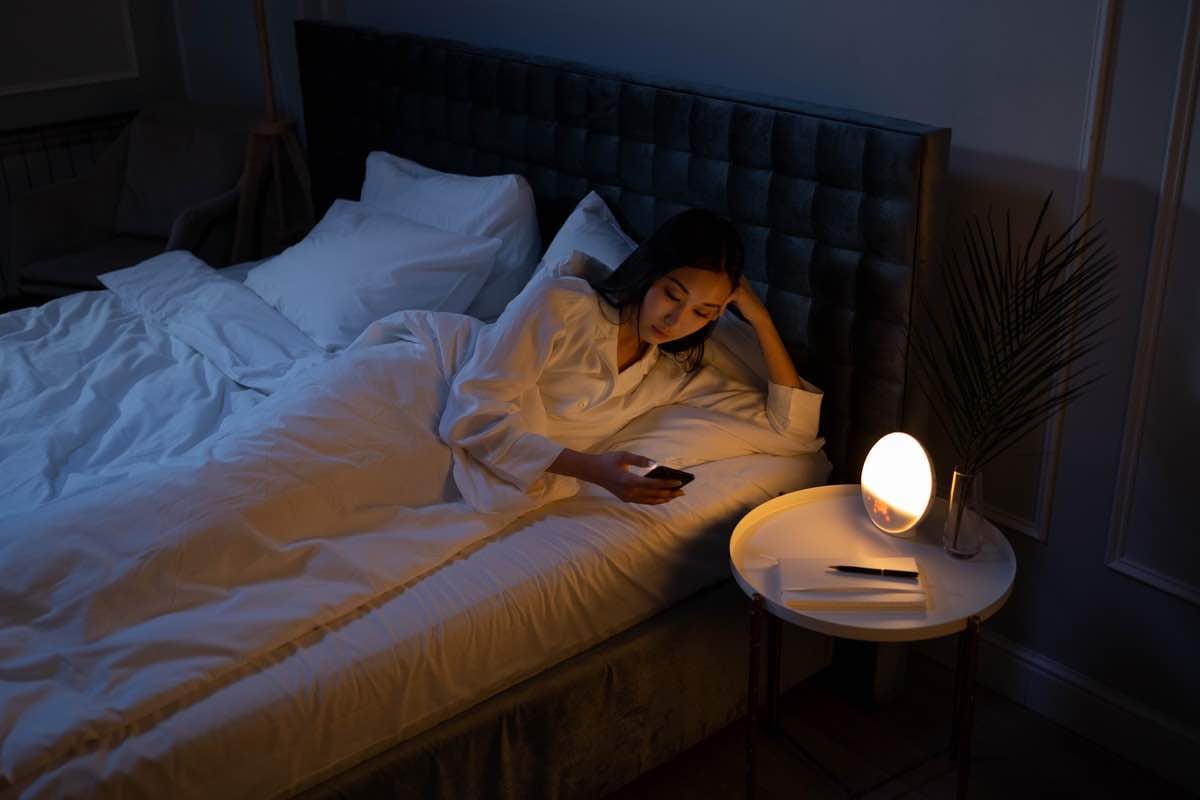
In Charles Dickens’ Barnaby Rudge (1840), there is a sentence that suggests that people used to sleep for two separate sleep periods. The text reads:
“He knew this, even in the horror with which he started from his first sleep, and threw up the window to dispel it by the presence of some object, beyond the room, which had not been, as it were, the witness of his dream.”
Before the invention of electricity, activity around a household was greatly limited once evening came. Because of this, people used to go to bed earlier. A historian named Roger Ekrich also found historical proof from the late 17th century that people used to sleep once the sun has set and woke a few hours later for about two hours, before going back to sleep until dawn. While they were awake, people would sew, chop wood or read under the light of an oil lamp.
Now that we have access to proper lighting at nighttime, the opposite has happened. Our waking hours have slowly encroached upon our evenings, until insomnia has become a widespread health problem.
People now find themselves waking up once or multiple times a night, sometimes unable to fall back asleep. Comparing our lifestyle with those in the previous centuries, can we still consider this normal?
Is It Normal to Wake Up in The Middle of The Night?
As the demands of the modern world have changed, people started working for longer hours and only slept late into the evening. Because of this, we gradually shook off the norm where we had to sleep periods.
Despite this, many of us still wake up at least once a night.
It might be normal for us to get up for a glass of water, make a quick trip to the toilet or check up on our sleeping children. However, most of us don’t have trouble falling back asleep.
The issues start to occur when people go through prolonged periods of wakefulness, experiencing this at least three nights a week.
People who experience sleeping disorders are also different from those who are naturally short sleepers. These people can sleep for six hours or less, and still feel well-rested when they wake up.
If you notice that you are in dire need of rest but are unable to get it, here are the possible causes.
Why Do You Wake Up at Night?
- Sleep Apnea and Other Disorders
The British Lung Foundation deems sleep apnea as one of the most common hindrances to sleep. This happens when your breathing stops and starts while you sleep.
Your partner or roommate may point out that you snore or make snorting or choking noises when you sleep. It is this phenomenon that jolts your brain awake, so that you may start breathing again. Though this may happen while you remain asleep, there are times where the jolting is very disruptive that you wake up gasping for air. Because of this, you may wake up multiple times throughout the night.
During the day, you will also experience symptoms like frequent headaches, difficulty concentrating and tiredness.
People who are also diagnosed with restless leg syndrome may feel uncomfortable when lying down. If your legs experience jerking sensations throughout the night, this can cause you to wake up.
- Insomnia
As mentioned earlier, insomnia is one of our century’s greatest sleep killers. This condition makes it difficult for people to fall asleep or stay asleep, causing people to be tired throughout the day. If you are finding it hard to go to sleep through the night and nap through the day for a few months, that might mean you have chronic insomnia. We recommend seeing a doctor, so that you can have your condition properly diagnosed.
Similar to sleep apnea, you may observe that you feel irritable during the day. When you do try to have an afternoon nap, it may still be difficult to fall asleep.
- Anxiety or Depression
Often, insomnia can either be a symptom of a deeper issue or the catalyst that leads to other illnesses. Worrying about different things can make it difficult for a person to calm down and sleep.
While some adults can experience feelings of anxiety because of something they’re going through, others find it difficult to control this. If you feel that your anxiety continues throughout the day and affects your daily life, you may experience restlessness, dizziness or heart palpitations.
Whether your anxiety is situational or medical, it can greatly disrupt your sleeping time.
- Full Bladder
Also called nocturia or nighttime urination, this condition wakes you up once or twice in the middle of the night because you need to pass urine. Most of the time, we may have just drunk more water than normal. Science also shows evidence that the older we get, the more frequent we need to go to the toilet.
Nighttime urination can be common among people who have:
- Hormonal changes: Whether you are pregnant or getting older, some hormonal or bodily changes can cause your body to produce more urine at night.
- An enlarged prostate: As men age, their prostate glands start growing and pressing against the urethra. This phenomenon prevents the bladder from emptying properly, leading males to urinate more often.
- Bladder conditions: An overactive bladder suddenly alerts the brain that it is full and needs to be emptied immediately.
- Medical conditions: Poor blood circulation can cause people to feel the need to urinate only when they are lying down. This is one of the few times you may raise your feet throughout the day, thus improving blood flow and allowing your kidney to remove fluid from your blood.
- Nightmares or Terrors
Normally, a person who experiences night terrors may not wake up or remember their dream. While they may flounder in bed or make noises, children are more likely to wake up than adults.
If you have a child, it is common for them to wake up in the middle of the night from the dream and describe it in detail. It is also important to observe if your child is less energetic throughout the day and if they need counselling for this.
Sometimes, chronic nightmares can be linked to some kind of trauma, stress or pre-existing mental health condition. Physical conditions such as migraines, restless legs syndrome and sleep apnea can also trigger nightmares.
If your nightmares are more frequent, it can make you feel as if you have not slept enough.
- Warm Room
As the day ends and you begin to prepare for bed, your body lowers your temperature to help you sleep comfortably. However, if you sleep in a warm room or a stuffy environment, this can cause you to wake up from night sweats and keep you from falling back asleep comfortably.
Apart from your room, the weather also plays a significant role in your sleeping patterns. According to the Great British Sleep Survey, people who live in wetter, more humid parts of the UK sleep less than those who live in drier places.
- Blue Light
Using interactive devices such as phones, gaming consoles or laptops can also negatively affect your sleeping patterns. While the television is a passive device, its blue light prevents your brain from properly producing melatonin, the hormone responsible for making you sleepy.
Apart from the blue light that these gadgets emit, constant notifications from your phone or noises coming from your consoles also keep you awake longer than you intend to. Both of these factors combined will lessen your chances of falling asleep immediately.
- Indigestion or Bloated
Eating too much food or ingesting alcohol or caffeine too close to bedtime can also keep you from falling asleep immediately. Foods that contain large amounts of fat, salt, spice or any type of acid can trigger indigestion or heartburn. The same can be said about consuming drinks with caffeine, alcohol or carbon dioxide.
Indigestion and bloating can also be triggered by overeating or changing your diet. Trying to go to bed before waiting for your stomach to properly process your food can only worsen the symptoms you may be experiencing. Sometimes, it may also wake you up in the middle of the night.
- Other Medical Conditions or Medicine Prescriptions
Different health conditions can also hinder your sleep. Chronic pain from arthritis, rheumatism, a new injury prevents you from fully relaxing.
Some people also suffer from neurological disorders, increasing their chances of developing insomnia.
If your doctor has also prescribed you with certain antihistamines, antidepressants, sedatives or cold medicine, you may wake up in the middle of the night with the need to empty your bladder. Some of these medicine’s ingredients cause your bladder muscles to relax, making it difficult to pass urine.
Once you understand what’s causing you to wake up, you can start addressing the problem with clear solutions.
How to Stay Asleep Through The Night
Aside from seeing a doctor to properly diagnose your symptoms, there are different remedies you can do to keep yourself from waking up.
- Improve Your Sleep Hygiene
Sleep hygiene refers to different habits you can practice to help you sleep better. We recommend setting a regular sleep schedule, conditioning your internal circadian rhythm to prepare you for sleep at the right time. This should also be followed on the weekends, when you’re not expected to wake up early.
Aside from a regular sleeping schedule, try limiting your bed to sleep and romance. Once your alarm rings, spend the rest of your day in another room where you can focus on work or recreation.
- Plan a Bedtime Routine
When you arrive home from work, you can wind down by doing relaxing activities. Try minimizing phone or computer usage and dedicate the last hour of your night to:
-
- Practicing meditation
- Listening to relaxing music
- Reading a book
- Organizing your things
- Sketching or coloring
- Taking a warm bath
- Assembling jigsaw puzzles
- Answering word or number puzzles
- Practicing meditation
We recommend finding an activity that helps you de-stress and gradually make you sleepy. If you live with a partner or have children, try spending quality time with them to strengthen your bond and lower your stress. You can read books to one another, exchange massages, tell them about your day or opt to cuddle.
- Avoid Strenuous Exercise
Aside from calming your mind, you can also help your body prepare for bed. While regular exercise can improve sleep, intense workouts are better for the morning or afternoon. If done before bedtime, your high body temperature and heart rate can make it harder for you to fall asleep.
Instead, we recommend doing some stretches or yoga to improve flexibility and ease muscle tension. You may also try walking around your neighborhood.
Though these are light exercises, we still suggest doing them around an hour or so before bedtime.
- Get Some Sun
If you are more of a night owl, you can slowly reset your circadian rhythm by spending more time in sunlight. When paired with regular exercises in the morning, you are naturally boosting your energy without the need for caffeine.
Studies also show that Vitamin D helps people sleep longer. We also recommend staying active during the day so that your body will look forward to resting and falling asleep during the evening.
- Lessen Nap Times
Napping for too long or too frequently during the day can also affect sleepiness at night. Once you feel the drowsiness coming after lunchtime, you can take a nap for 30 minutes or less.
- Avoid Big Meals and Drinks
To prevent your stomach from bloating during the evening, we recommend keeping your dinners light and caffeine- and alcohol-free.
Depending on your metabolism rate, caffeine can stay in your system up to six hours. Even drinking a cup of coffee during the late afternoon can negatively affect your sleep patterns already.
While alcohol can make you fall asleep quickly, people often find themselves waking up in the middle of the night from dehydration.
Having a cup of chamomile tea, warm milk or banana smoothie are better, healthier alternative beverages that can promote sleep.
- Create a Comfortable Environment
For this tip, you need to know what kind of environment you prefer. If you live in a humid place, you can upgrade your bedroom by setting your thermostat to a cooler temperature. If the place is too dry that you wake up with a dry throat and itchy eyes, you may consider getting a humidifier.
Use some blackout curtains to keep your room dark and use orthopedic-recommended mattresses or pillows. When you pair them with an electric blanket, your muscles can stay relaxed and soothed throughout the night. These can ease your discomfort, especially if you wake up at night from pain.
- When You Do Wake Up… Get Out of Bed
There will be moments where you find yourself waking up in the middle of the night. If you can’t fall back asleep after 15 minutes, you can try leaving your room and look for a relaxing activity to do. This may mean continuing the book you were reading or the jigsaw puzzle you were trying to finish for a few minutes.
When you’re tired again, go back to the bedroom and sleep. During the few minutes that you are up and about, resist the temptation to check your phone or from doing anything too stimulating.
Having a restful night may be elusive to some, but it is not impossible to reach. There are various ways you may try to address this issue. Whether it’s incorporating exercise into your daily activities or purchasing some leg warmers, improving your sleep hygiene can bring positive changes to your life.
Keep it Warm with Wellcare
From heating pads, heating cushions, foot warmers to electric blankets, Wellcare has a wide range of solutions to help you sleep better and keep your feet warm at all times. For your complete warmth, comfort, and safety, these are made using only the finest available materials.
Our products are also equipped with the 4D Dynamic Warmth Flow system (4D DWF). An innovation in electric heating technology, the 4D DWF mimics the human body’s breathing to ensure even heat distribution throughout the surface of the product.
As we know, the key to falling asleep and getting a good night of sleep is temperature. Therefore, we also upgraded our electric blankets with BBC (Best bed climate) designs, which automatically adjust the electric blanket’s temperature to help everyone sleep better.
Are you looking for a better night of sleep? We've created an Ebook for you on "How to create the perfect sleeping Environment?" Click on the link below to download it now!
References:


.png?width=512&name=united-kingdom%20(1).png)


